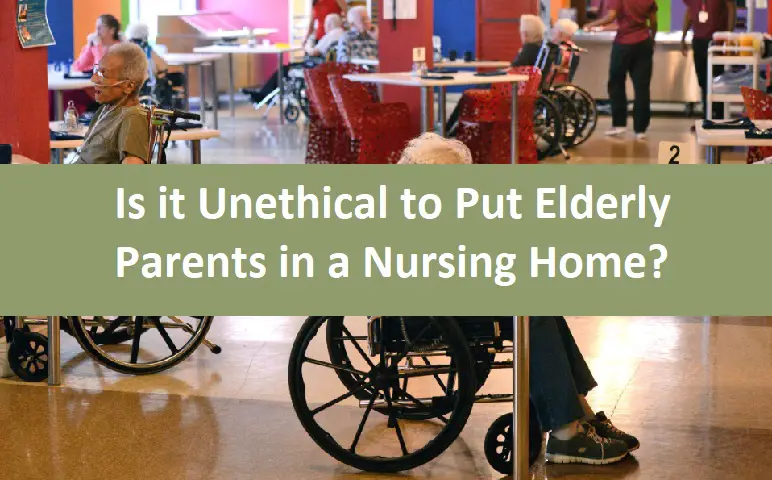As people age, they may find that they require more help with day-to-day activities, such as dressing, bathing, and preparing meals. When an elderly parent requires more help than their family can provide, the question of whether or not to place them in a nursing home may arise. While it can be a difficult decision to make, it is important to consider the ethical implications of putting elderly parents in a nursing home.
Is it Unethical to Put Elderly Parents in a Nursing Home?
The decision to place an elderly parent in a nursing home is a complex one that can be influenced by a variety of factors. While some may argue that it is unethical to put elderly parents in a nursing home, this is not necessarily the case. Ultimately, the decision to place a parent in a nursing home should be based on their individual needs and circumstances.
In some cases, placing an elderly parent in a nursing home may be the best option for their health and well-being. Nursing homes are designed to provide specialized care for those with complex medical needs, such as Alzheimer’s disease or Parkinson’s disease. They also provide round-the-clock supervision and assistance with activities of daily living, such as bathing, dressing, and eating.
Should You Help Them Remain at Home?
While nursing homes can provide excellent care, many elderly people prefer to remain in their own homes for as long as possible. In-home care can provide a good alternative to nursing homes for those who wish to remain in their own homes. In-home care services can include assistance with activities of daily living, medication management, and even transportation to medical appointments.
In-home care can also provide a level of companionship and socialization that may be lacking in a nursing home. For some elderly people, the thought of leaving their homes and moving into a nursing home can be traumatic and distressing. It is important to consider their wishes and preferences when making a decision about their care.
Signs That It May Be Time for a Nursing Home
There are several signs that may indicate that it is time to consider placing an elderly parent in a nursing home. These signs may include:
- Difficulty with basic activities of daily living, such as bathing, dressing, and eating
- Frequent falls or accidents
- Memory loss or confusion
- Worsening of medical conditions, such as diabetes or heart disease
- Social isolation and loneliness
- Inability to manage medications or follow medical instructions
Assessing the Quality of Nursing Homes
If you have decided to place an elderly parent in a nursing home, it is important to choose a facility that provides high-quality care. There are several factors to consider when assessing the quality of a nursing home, including:
- Staff qualifications and training: The nursing home should employ qualified and trained staff who have experience working with elderly people.
- Facility cleanliness and safety: The nursing home should be clean and well-maintained, with appropriate safety measures in place.
- Resident quality of life: The nursing home should prioritize the well-being and quality of life of its residents, providing opportunities for socialization, recreation, and engagement.
- Family involvement: The nursing home should encourage and facilitate family involvement in the care of their loved ones.
Neglect in Nursing Homes
While most nursing homes provide excellent care, neglect can sometimes occur. Neglect can take many forms, including failure to provide adequate food or hydration, failure to properly clean or dress residents, and failure to provide necessary medical care. Signs of neglect may include unexplained weight loss, dehydration, bedsores, and infections.
Elder Abuse in Nursing Homes
Elder abuse can also occur in nursing homes and can take many forms, including physical abuse, emotional abuse, sexual abuse, and financial abuse. Signs of elder abuse may include unexplained bruises or injuries, sudden changes in behavior or mood, unexplained financial transactions, or missing personal items.
It is important for family members and caregivers to be aware of the signs of neglect and abuse and to take action if they suspect that it is occurring. This may involve reporting the abuse to the nursing home administration or to the authorities, as well as seeking legal action if necessary.
Ethical Issues in Elderly Care
When making decisions about the care of elderly parents, there are a number of ethical issues that may come into play. These may include questions about autonomy and decision-making, as well as issues related to the quality of life and the preservation of dignity.
One of the most important ethical considerations in elderly care is the principle of autonomy. Elderly people have the right to make decisions about their own care, and family members and caregivers should work to respect their wishes and preferences as much as possible. However, in cases where the elderly person is unable to make decisions for themselves, family members and caregivers may need to make decisions on their behalf.
Another important ethical issue in elderly care is the principle of beneficence. This principle emphasizes the importance of doing good and promoting the well-being of others. In the context of elderly care, this may involve making decisions that prioritize the health and well-being of the elderly person, even if those decisions are difficult or unpopular.
Experiencing Guilt When Placing Your Parents in a Nursing Home
Placing an elderly parent in a nursing home can be a difficult decision for family members and caregivers, and it is not uncommon for them to experience feelings of guilt or remorse. These feelings may be exacerbated by societal messages that suggest that placing elderly parents in nursing homes is a sign of neglect or abandonment.
It is important for family members and caregivers to recognize that placing an elderly parent in a nursing home can be a responsible and compassionate decision and that it is not a reflection of their love or commitment to their parent. It is also important for them to seek support and guidance from friends, family members, or professionals who can help them work through their feelings and emotions.
Regretting Your Decision Despite Trying to Act Ethically
Even when family members and caregivers make the decision to place an elderly parent in a nursing home with the best of intentions, they may still experience regret or doubt about their decision. This may be due to a variety of factors, including feelings of guilt, concerns about the quality of care provided in the nursing home, or worries about the impact of the decision on the elderly parent’s quality of life.
If family members and caregivers find themselves regretting their decision despite trying to act ethically, it is important for them to reassess their options and seek support and guidance. This may involve exploring alternative care options, such as in-home care or assisted living, or seeking out counseling or therapy to work through their feelings and emotions.
The Bottom Line
In conclusion, the decision to place an elderly parent in a nursing home is a complex one that should be based on their individual needs and circumstances. While nursing homes can provide excellent care for elderly people with complex medical needs, in-home care may provide a good alternative for those who wish to remain in their own homes. It is important for family members and caregivers to be aware of the signs of neglect and abuse in nursing homes and to advocate for the well-being and dignity of their loved ones. Finally, it is important for family members and caregivers to seek support and guidance as they navigate the difficult decisions and emotions associated with placing an elderly parent in a nursing home.

Morgan Elfman is a compassionate writer, dedicated caregiver, and passionate advocate for senior well-being. Born and raised with a deep sense of empathy and a natural inclination towards service, Morgan has devoted her life to making a positive impact on the lives of seniors.
As a writer for www.choiceseniorlife.com, Morgan utilizes his skills to create insightful and informative content that addresses the unique needs and challenges faced by seniors and their families. Her articles not only provide valuable information on health, lifestyle, and care options but also strive to inspire and empower seniors to lead fulfilling lives.

